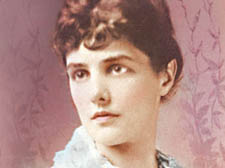|
|
 |
| |

Jennie Churchill: joie de vivre |
Winston’s distant mother
Jennie Churchill:
Winston’s American Mother.
By Anne Sebba. John Murray
WINSTON Churchill always claimed that he was the political heir of his father, the brilliant but maverick Lord Randolph Churchill, but he undoubtedly got his indomitability and joie de vivre from his mother.
She was born Jennie Jerome in New York in 1854, one of three daughters of the millionaire Leonard Jerome. Beautiful, musical and extremely vivacious, she met and captivated Lord Randolph, the second son of the seventh Duke of Marlborough, at Cowes in August 1873.
Marrying an American heiress was, or later became, a common response from impoverished members of the British aristocracy to their financial problems. There was also in this case a strong physical attraction. The couple seem to have been remarkably quick off the mark, with Winston born six months after the wedding in April 1874.
Things, however, soon went wrong. Exiled to Ireland after ostracism by the Prince of Wales, the couple spent much of their time apart. Winston’s brother Jack, born in 1880, was almost certainly the son of Lord Falmouth.
For all Lord Randolph’s brilliance and his huge popularity among Tory voters, neither fully brought out by Anne Sebba, he made enemies among the leadership. He overplayed his hand once too often over a misjudged resignation in 1886 and this brought an end to his political career. Randolph’s erratic behaviour was almost certainly due to the long-term effects of syphilis, leading in the years after his resignation to a painful decline, near insanity and death. Leonard Jerome also lost most of his money, leaving Jennie with expensive habits but a permanently inadequate income.
Jennie was a distant mother to the young Winston, who turned instead to his beloved nanny, Mrs Everest; but mother and son’s later relationship became a very strong and mutually supportive one.
Widowed in 1895, Jennie married again twice, to beautiful men much younger than herself. She clearly also had many affairs, including probably one with the Prince of Wales. Her Reminiscences, however, were an exercise in non-revelation, and she was good at covering her tracks, so any sort of body count remains inconclusive.
Anne Sebba’s Jennie Churchill is a readable book on an excellent subject. It doesn’t have a great deal in it that is new, and it never takes us very close to its subject or to the world she lived in, but is nevertheless well researched, clearly written and entertaining.
Martin Sheppard
• |
 |
|
 |
 |
|
 |
|


